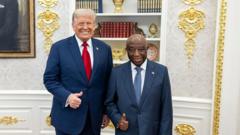President Trump has announced plans to impose 50% tariffs on Brazilian imports, citing political motives related to former President Bolsonaro's legal troubles. Brazil's response indicates potential tariffs on U.S. goods, further escalating tensions between the two nations.
U.S.-Brazil Relations Strain as Trade War Looms Over Political Discord

U.S.-Brazil Relations Strain as Trade War Looms Over Political Discord
Tensions rise between the U.S. and Brazil as President Trump threatens tariffs in response to legal actions against former Brazilian President Bolsonaro.
In a surprising development, the trade relations between the United States and Brazil are on the brink of a conflict reminiscent of a trade war. This emerging confrontation is primarily anchored in political disagreements rather than pure economic calculations. On July 10, 2025, President Trump declared his intention to impose hefty 50% tariffs on imports from Brazil. Trump's justification, however, extended beyond economic reasoning—despite a trade surplus that the U.S. maintains with Brazil. Instead, Trump characterized the Brazilian government's actions against Bolsonaro as a "witch hunt," a reaction to the former president facing legal challenges linked to an attempted coup.
In a swift rebuttal, Brazilian President Luiz Inácio Lula da Silva asserted his country's sovereignty in an official statement, promising retaliatory tariffs on American imports. Lula emphasized Brazil's stance on maintaining independent institutions and refusing any foreign interference in its internal matters. While Brazil considers specific sectors for these tariffs to prevent widespread economic disruptions, the government is still navigating the precise nature of its countermeasures against U.S. goods.
The friction between these two prominent nations highlights a deeper saga involving Trump, Bolsonaro, and Lula. Trump's utilization of trade barriers as both a weapon and a tool for political vendettas has drawn criticism, raising questions about the underlying motivations of such drastic economic actions. As this situation unfolds, observers are keen to understand the nature of American exports to Brazil, the range of Brazilian products in U.S. markets, and the implications of Bolsonaro's ongoing legal issues.
The threading of trade policy and political dynamics suggests a complex landscape ahead, with potential repercussions for both countries' economies and bilateral relations. As developments continue to emerge, both U.S. and Brazilian citizens await clarity on the impending consequences of this escalating trade dispute.
In a swift rebuttal, Brazilian President Luiz Inácio Lula da Silva asserted his country's sovereignty in an official statement, promising retaliatory tariffs on American imports. Lula emphasized Brazil's stance on maintaining independent institutions and refusing any foreign interference in its internal matters. While Brazil considers specific sectors for these tariffs to prevent widespread economic disruptions, the government is still navigating the precise nature of its countermeasures against U.S. goods.
The friction between these two prominent nations highlights a deeper saga involving Trump, Bolsonaro, and Lula. Trump's utilization of trade barriers as both a weapon and a tool for political vendettas has drawn criticism, raising questions about the underlying motivations of such drastic economic actions. As this situation unfolds, observers are keen to understand the nature of American exports to Brazil, the range of Brazilian products in U.S. markets, and the implications of Bolsonaro's ongoing legal issues.
The threading of trade policy and political dynamics suggests a complex landscape ahead, with potential repercussions for both countries' economies and bilateral relations. As developments continue to emerge, both U.S. and Brazilian citizens await clarity on the impending consequences of this escalating trade dispute.





















